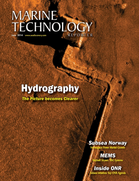C-MAR DP Training in Brazil
By Claudio Paschoa
The modern offshore maritime industry relies on a variety of DP vessels, from OSVs to Drillships and tankers, almost all vessels serving the oil and gas industry need to be DP capable in order to safely operate offshore. The growth experienced in Brazil due to the uncorking of huge deepwater pre-salt plays has caused a steady demand for new ships, rigs and vessels, maritime officers and DP operators in the country. MTR’s correspondent in Brazil talks to Mauricio Santos, C-MAR Country Manager, about the reality of DP training in Brazil.
C-MAR is a global provider of manpower, engineering and support services to the maritime and offshore sectors. The C-MAR Group owns and operates DP training centers in London, Croatia, Mumbai, Singapore and Brazil, offering basic and advanced courses for DP operators in accordance with the curriculum set by the Nautical Institute (NI) as well as tailored courses for shore based personnel involved in dynamic positioning. C-MAR also provides DP Maintenance Courses at some of its global facilities.
As a provider of NI accredited courses, C-MAR offers high standards of DP training and technical services to the offshore and maritime industries. C-MAR’s DP training center in downtown Rio de Janeiro offers Converteam and Kongsberg DP simulators for its students, which hail from all over Brazil and South America. All courses provide practical and real experiences based on the extensive, combined knowledge and expertise from C-MAR’s experienced instructors. All DPC instructors have more than five years’ experience in the operation of DP vessels, covering dive support, IMR, anchor handling, platform supply and drilling operations vessels. C-MAR DP Centers also provide technical services to the marine industry in the form of consultancy for the design and operation of DP vessels, Failure Mode Effect Analysis and Audits to IMCA guidelines.
Santos hosted a tour of the training center and explained how the training scheme is organized. “The Basic course lasts four days and is introductory level, covering the basics of all areas of DP. Upon completion of the course our students are apt to start simulator exercises in one of our DP’s simulators, students are required to complete 30 days of seagoing familiarization after the basic course.”
Students at C-MAR’s training center in Rio come from all over Brazil and South American countries belonging to Mercosul (Free Trade agreement between some South American countries). “The extensive simulator training in the advanced course is done using Converteam’s DP systems, students are also required to complete 30 days of familiarization at sea upon completion of the basic course,” Santos said.
Santos has been with the company for more than four years, and he explained that the C-MAR’s DP training course began almost a decade ago in a small office in Macaé, a city in the northeast of the state of Rio de Janeiro, which is the main O&G hub for the Campos Basin. With the success of the course it relocated to the current suite of offices in Rio.
“We train between 300 and 400 DPOs per year, with a maximum of eight students per week in the basic course and four students per week in the advanced course,” said Santos. A DP Maintenance Course is also offered at the Converteam training facility in Macaé and also has a four day duration, targeting individuals who may be required to perform, or assist in, the maintenance of a vessel’s Dynamic Positioning System. The course includes System elements, Interfacing, Monitoring and Documentation, normally this course is taken by electronics technicians who will do maintenance and repair of the systems aboard a vessel. DP systems are highly complex and are made up of an array of GPS transmitters/receivers, sensor and control hardware and power modules, usually located below a vessel or ship’s bridge, and these are connected to the DP main and backup modules located on the bridge.
“The DP courses are now administered in English and this sometimes causes problems for students that do not have a advanced level of English, so many times teachers need to explain things in English and follow up in Portuguese, which sometimes causes courses to be extended by a day or two. It’s important for prospective students to hone their English skills before signing up for any of our courses,” said Santos. The Nautical Institute has full oversight over the DP courses to the point where courses are filmed and the NI can check on classes in real-time. “Since all classes are filmed, the NI can patch in at any time and check on the class’ development, what is being taught and what difficulties the students are having. It’s common for post-accident investigators to check on the class videos to see if the DPO who had the accident had similar problems during simulations. What happens during simulator training here is reflected on real-life situations offshore,” said Santos.
With the continuing growth of the oil and gas industry in Brazil, there has also been a major growth in shipbuilding and ship, vessel and rig leasing. This has significantly increased the demand for Brazilian DP operators since main contractor Petrobras requires specific levels of local content on each ship or vessel it hires. “We are experiencing a continuous growth in the Brazilian offshore market, and in the near future we may need to expand our training facilities in order to accommodate the influx of prospective DPO’s. Looking at the future, it is quite clear that the offshore growth in Brazil will continue at least for another decade. With the complex nature of drilling for and producing deepwater pre-salt oil and then in some cases transferring this oil from FPSOs to export tankers offshore, there is no doubt that the demand for DPOs will continue to grow and C-MAR will need to adapt accordingly. I believe we are well prepared to tackle this demand at C-MAR,” said Mauricio.
(As published in the June 2014 edition of Marine Technology Reporter - http://www.marinetechnologynews.com/Magazine)

 December 2025
December 2025



